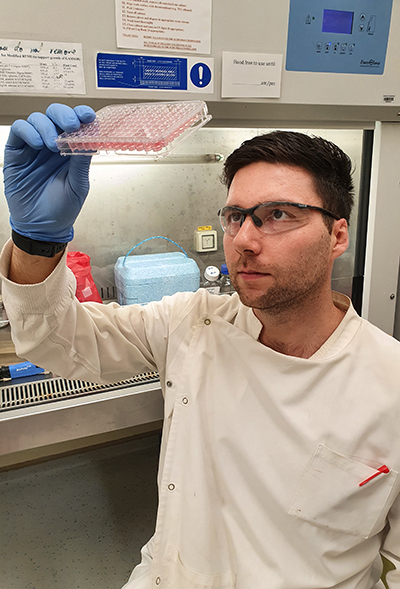An experimental Alzheimer’s disease treatment is proving effective at treating some of the most persistent, life-threatening antibiotic-resistant bacteria.
Researchers from The University of Queensland, The University of Melbourne and Griffith University have discovered that the drug called PBT2 is effective at disrupting and killing a class of bacteria – known as Gram-negative bacteria – that cause infections such as pneumonia, bloodstream infections and meningitis.
UQ’s Professor Mark Walker said the metal transport drug may offer a last line of defence against some of the world’s most difficult to treat superbugs.
“The emergence of antibiotic-resistant superbugs is an urgent threat to human health, undermining the capacity to treat patients with serious infection,” Professor Walker said.
“Alternative strategies to treat such multi-drug resistant bacteria are urgently needed.
“Led by UQ’s Dr David De Oliveira, our team hypothesised that by using this experimental Alzheimer’s treatment to disrupt the metals inside these bacteria, we would also disrupt their mechanisms of antibiotic resistance.
 “This was shown to be the case, with the Alzheimer’s drug – combined with the antibiotic polymyxin – successfully tackling antibiotic-resistant superbugs like Klebsiella pneumoniae, Acinetobacter baumannii, Pseudomonas aeruginosa and Escherichia coli.”
“This was shown to be the case, with the Alzheimer’s drug – combined with the antibiotic polymyxin – successfully tackling antibiotic-resistant superbugs like Klebsiella pneumoniae, Acinetobacter baumannii, Pseudomonas aeruginosa and Escherichia coli.”
Griffith University’s Professor Mark von Itzstein AO from the Institute for Glycomics said the new treatment was effective, and offered a range of other benefits.
“Based on its use as an experimental Alzheimer’s treatment, there’s been a significant amount of solid science done on this drug already,” Professor von Itzstein said.
“We know, for example, that clinical studies of PBT2 show that it is safe for use in humans.
“And, given that we’ve been able to combine it with the antibiotic polymyxin to treat polymyxin-resistant bacteria, we may be able to make other now-ineffective antibiotics become effective again for treating infectious diseases.
“This could resharpen, so to speak, some of the weapons we thought we’d lost in our fight against antibiotic-resistant bacteria.”
The University of Melbourne’s Associate Professor Christopher McDevitt, from the Peter Doherty Institute for Infection and Immunity (Doherty Institute), said the drug had already proved effective beyond the petri dish.
“Animal studies show that the combination of polymyxin and PBT2 kills polymyxin-resistant bacteria, completely clearing any infection,” Associate Professor McDevitt said.
“Hopefully in the not-too-distant future people will be able to access this type of treatment in the clinic.
“New techniques are critical in addressing this building threat to human health, and this treatment is an additional weapon in our arsenal to fight the accelerating threat of antibiotic resistance.
“If these new solutions aren’t developed, it’s estimated that by 2050, antimicrobial-resistant bacteria will account for more than 10 million deaths per year.
“This new treatment could help turn the tide on antibiotic resistance.”
The study is published in Science Translational Medicine (DOI: 10.1126/scitranslmed.abb3791).
Images: UQ’s Dr David Oliveira analysing samples in the lab.








